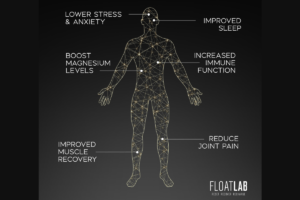March 10, 2022
The Science of Sensory Deprivation in 2022

It’s 2022 and our good health has never been more important.
The past few pandemic years have really brought home the fact that nothing is more valuable than our health.
There has been a flurry of activity in sourcing up-to-date information on health solutions. We’re here to talk about one of those – sensory deprivation float tanks.
While it may seem like a new fad with celebrities dipping in and spouting the benefits, the concept is actually more than half a century old.
In 1954 an American physician and neuroscientist, John C. Lilly, innovated a new way to study the origins of consciousness, in an environment where senses are deprived on their input – leaving just the mind. In the 1970s, floatation tanks started to be commercialized and took off.
Over the decades, it’s been discovered that float tanks offer REST – Restricted Environmental Stimulation Therapy.
A Psychology & Health study in 2005 looked over 25 articles and studies investigating REST and concluded REST has positive effects on psychology (lowering cortisol and blood pressure), physical performance and our well-being – it is a useful stress management tool.
Since then, research has continued a journey of discovery to further findings.
Mind
Increasing scientific evidence shows float tanks reduce stress, tension headaches and help treat anxiety disorders.
One 2018 study published in PLOS One found a single, one-hour sensory deprivation float session significantly reduced anxiety for people on the trial, who were living with stress and anxiety related disorders.
Float tanks offer an opportunity to practice mindfulness, a technique taught to many when suffering the ill effects of stress or mental health problems.
A flow on effect of floating is better sleep – another major factor being proven as having a massive impact on our overall health and wellbeing.
Body
Less stress and anxiety are invaluable. When in stress, our whole system operates in a state of panic, leaving health suffering, immunity rundown and us vulnerable to serious conditions.
Clinical research on REST points to benefits for easing headaches and chronic muscle tension pain, particularly in the common areas of back and neck.
A float session helps to switch our body from fight or flight response, which is a sympathetic nervous system response, to the relaxed parasympathetic nervous system, responsible for rest and digestion.
In increasing numbers, athletes are turning to float tanks for recovery. Sports Psychologists at the Australian Institute for Sport have been advocating use for athletes for more than five years because of benefits of regeneration, restoration and mental clarity.
Soul
Creativity comes from our soul and studies have shown it’s bolstered by float tank sessions. The Universities of British Colombia and Vermont found increased creativity after a float session.
Mindfulness is a as a practice as old as human kind itself, with modern adaptations to help improve mood and mental stress and anxiety. On the level of soul awakening, mindfulness brings you to ‘the ultimate truth’ – who you are, why you are here.
In a float tank, science meets the soul, harking back to its initial inception. This is where we think future research will take us – as science enters the precipice of human consciousness.
Are You Ready?
For anyone wanting to access optimal health, float tank sessions help you on your wellness path.
If this as piqued your interest, but you still have reservations or questions, our experts are happy to talk it through with you.
In Perth, Float Lab are the leading scientifically-based, professional float experiences.
Some of our clients had personal reasons holding them back, from skin sensitivities, fear of the water, ear issues or claustrophobia, but we’ve found: where there’s a will, there’s a way!
We look forward seeing you at one of our Float Lab centres soon. Give us a call, or book your Float Lab session online now.